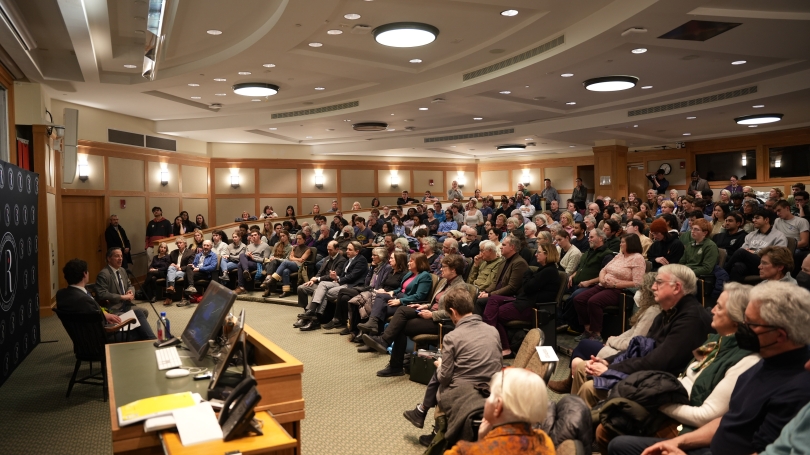
- Public Policy
- Leadership
- Funding
- News & Events
- About the Center
Back to Top Nav
Back to Top Nav
Back to Top Nav
Back to Top Nav
On January 8, 2024, The Rockefeller Center hosted Rep. Jamie Raskin (D-MD) to deliver the Roger S. Aaron '64 Lecture. Raskin discussed the 2024 presidential election and its impact on American democracy with Government Professor Herschel Nachlis, who also serves as Senior Policy Fellow and Associate Director of The Rockefeller Center.
Raskin was introduced by Professor Herschel Nachlis, who joked that people on campus have described Raskin as "hero" and "GOAT."
Raskin began his remarks by referencing a quote familiar to all Dartmouth students, uttered by Daniel Webster in the Supreme Court case Dartmouth College v. Woodward in 1819. Describing the case as "amazing," Raskin praised Dartmouth and said "it's a small College, but there are those of us who love it." He contrasted the case with 2010's Citizens United v. Federal Election Commission, which Raskin said "transformed every corporate treasury in America into a political slush fund."
Raskin continued his speech with another quote, this time from Thomas Payne in the 1776 pamphlet Common Sense. "Let the future world be told that in the depth of winter, when only hope and virtue could survive, both the city and the country rose to meet a common threat and to defeat it," Raskin quoted. He described Payne's words as "resonant" for the political climate of the winter of 2024, with a consequential presidential election approaching.
Raskin's talk, which examined the battle between democracy and autocracy, maintained strong electoral undertones throughout. Raskin described former President Trump and his followers as reviving, "the dark impulses that we had hoped we had left behind in the last century." These forces, according to Raskin, include "white supremacy, misogyny, anti-semitism, authoritarianism, and fascism."
Over the last decade, America has undergone a "contractionary period for democracy," according to Raskin. He pointed to the 2013 Supreme Court case Shelby County v. Holder which weakened the Voting Rights Act as well as the previously mentioned Citizens United case.
Raskin definitively labeled entities that he believes are working against American democracy. "The plutocrats in the Supreme Court majority, the theocrats in MAGA and the House of Representatives, the kleptocrats in Mar-a-Lago, the autocrats in Moscow, all of them are combining to try to dismantle democracy in America," Raskin said.
Turning to January 6, Raskin sharply criticized "the gang" that "bloodied, wounded, and hospitalized 150 of our police officers," adding that election certification interference did not even happen during the Civil War. In Raskin's words, "January 6th was just the culmination of Donald Trump's efforts to undo the results of the election."
Raskin then shifted from discussing domestic problems to identifying who the United States can rely on to solve them. He characterized the Russian invasion of Ukraine as "filthy, bloody, and imperialist," declaring that "the autocrats are not going to protect us."
Discussing "the kleptocrat himself, Donald Trump," Raskin pointed to an Oversight Committee report that Trump "pocketed more than $7.8 million from the Chinese government, the Saudi government, Turkey, United Arab Emirates, basically every unsavory regime on earth." Raskin added that the committee only received information about four of Trump's more than 150 businesses.
"Who's going to save us from all this?" Raskin finally asked. "The Democrats are going to do it. The Democrats, with all of our flaws and all of our imperfections. Even with our imperfections as messengers of our own message and our own program, it's the Democrats that are the party of democracy." According to Raskin, the Democratic Party is the only political party that stands up for everyone's right to vote, stands by the results of democratic elections, supports aid to Ukraine, and believes in and confronts climate change.
Raskin added that President Franklin D. Roosevelt did not refer to the party as the Democratic Party, rather, "he called us with a capital 'D,' the Democracy." "Democracy is always an unfinished project," Raskin concluded. "Democracy isn't a historical process. It's in motion."
By Varun Swaminathan '26, Rockefeller Center Student Assistant for Public Programs